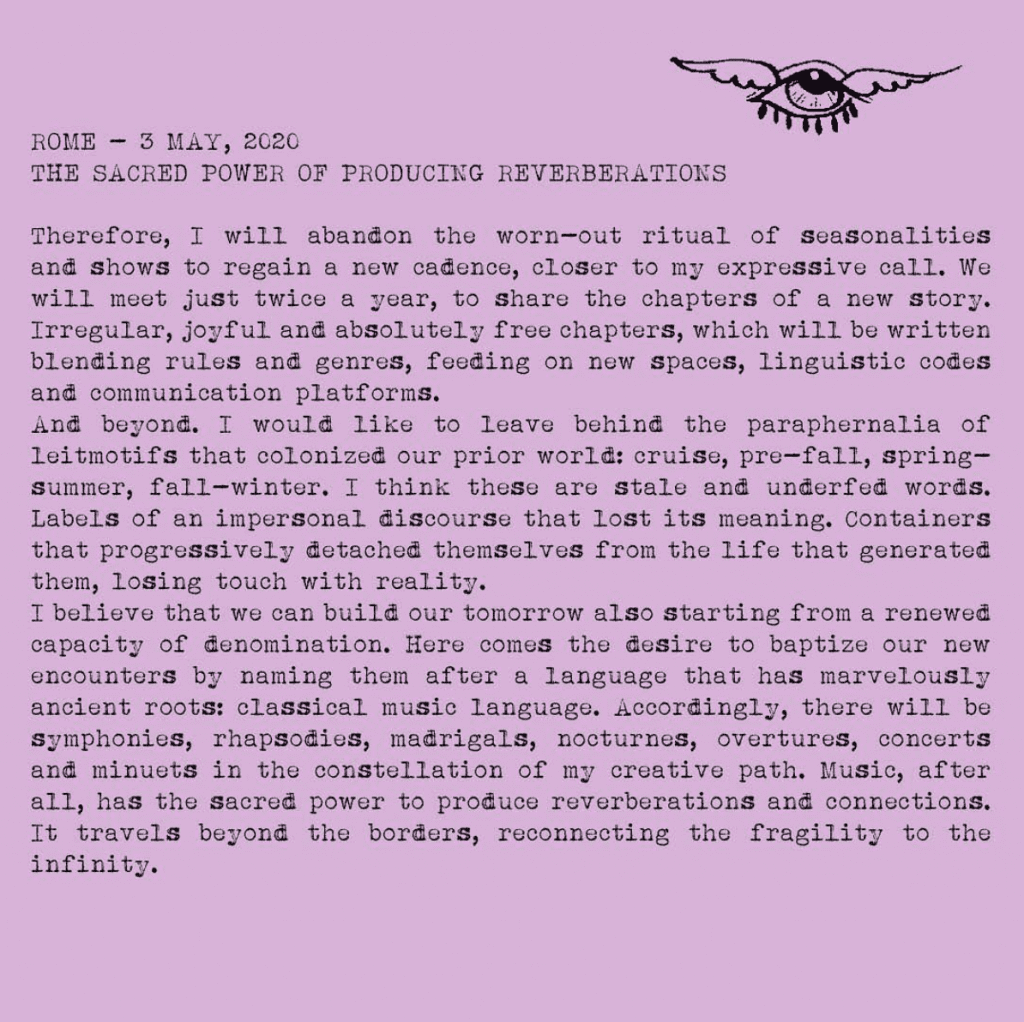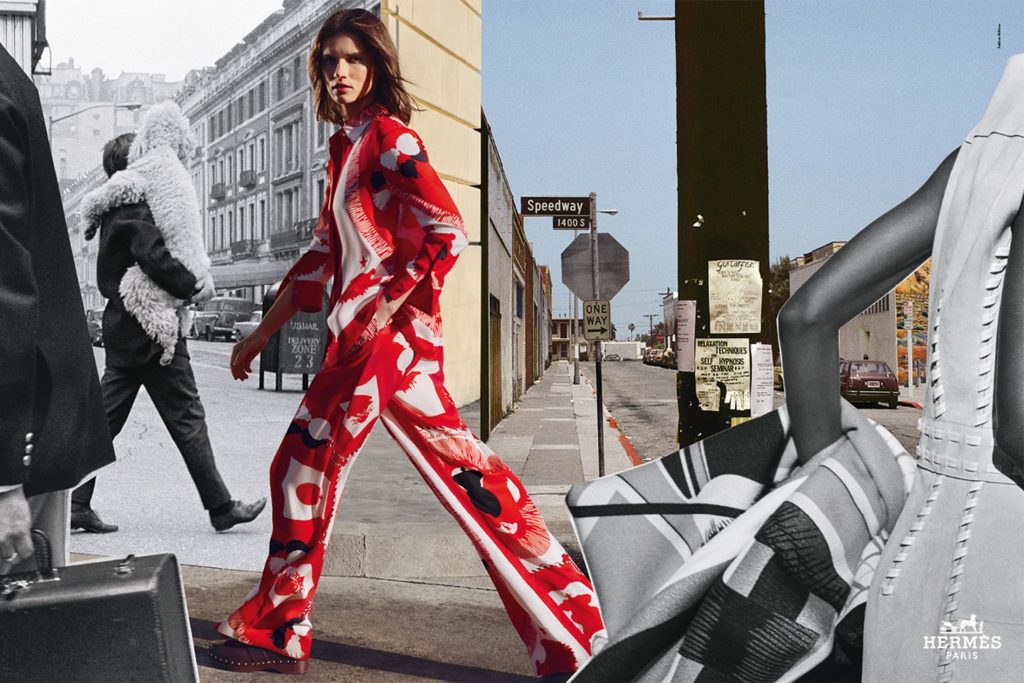Gucci creative director Alessandro Michele revealed by way of a statement on Instagram that the multi-billion fashion brand will “abandon the worn-out ritual of seasonalities and shows to regain a new cadence.” Instead of engaging in the traditional fashion calendar of “cruise, pre-fall, spring/summer, autumn/winter,” Michele says, “We will meet just twice a year, to share the chapters of a new story. Irregular, joyful and absolutely free chapters, which will be written blending rules and genres, feeding on new spaces, linguistic codes and communication platforms.”
The move by Gucci comes just weeks after fellow Kering-owned brand Yves Saint Laurent revealed that it will not present its collections “in any of the pre-set schedules of 2020.” The Paris-based brand, under the control of creative director Anthony Vaccarello and chief executive Francesca Bellettini, said in a statement in late April that it will move away from the traditional fashion month calendar in furtherance of an attempt to “take ownership of its calendar and launch its collections following a plan conceived with an up-to-date perspective, driven by creativity.”
“Conscious of the current circumstance and its waves of radical change,” a nod to the spread of the COVID-19 and the sizable impact that it has had on brands’ current operations and bottom lines, as well as their plans for the future, “Saint Laurent has decided to take control of its pace and reshape its schedule,” the nearly-60 year old fashion house asserted. “Now more than ever, the brand will lead its own rhythm, legitimating the value of time and connecting with people globally by getting closer to them in their own space and lives.”
Bellettini said in connection with the announcement that brand’s change-making efforts will go beyond merely the scheduling of its fashion shows, as it is “looking at how we can create efficiencies in advertising and promotion,” which come in line with its larger mission “over the last four years [to] extend the life of our collections in-store, and this strategy will be taken farther by introducing novelties with a timing that better reflects real-life needs and by planning our campaigns to align with it.” Vaccarello echoed this notion, stating, “Our approach to the collections has always been less ‘seasonal’ than what the term usually implies. Each collection is an evolution of what has come before, combining timeless Saint Laurent pieces and new silhouettes.”

Gucci and Saint Laurent’s industry standard-disrupting announcements follow from an evolving calendar, including the digitalization of the Spring/Summer 2021 men’s and couture shows in Paris this summer, and the combination of the previously-scheduled men’s shows in Milan, which were slated to take place in mid-June, with the women’s shows in September. They also come as various groups and industry stakeholders propose alternative models for the industry, one that is known for perpetuating (and banking on) the constant need for newness, and for the pollution and sizable waste that comes along with the multi-seasonal model.
In an effort to move away from the skewed fashion calendar and the lack of sustainability associated with the need to continually produce more and more garments and accessories, Belgian designer Dries Van Noten made headlines this month when he joined with Andrew Keith, who is the president of retailers Lane Crawford and Joyce, and Altuzarra chief executive officer Shira Sue Carmi, to reveal a new initiative aimed at fixing fashion, so to speak. “It is not normal to buy winter clothes in May. It doesn’t make sense,” Van Noten said this month, reflecting on the status quo of the fashion system. More than merely being impractical, the Belgian designer said that such a schedule is “not respectful to the customer, who buys at full price, [only] to see it marked down 50 percent six weeks later.”
Along with Keith and Carmi, Van Noten issued and open letter and laid out a number of steps that they say they hope will enable the multi-trillion dollar fashion industry to “become more responsible for our impact on our customers, on the planet and on the fashion community, and bring back the magic and creativity that has made fashion such an important part of our world.” Since the letter was released, hundreds of designers, executives, retailers, and public relations heads – from Tory Burch and Jil Sander CEO Axel Keller to Nordstrom president and chief brand officer Pete Nordstrom and Neiman Marcus-owned e-commerce company MyTheresa’s CEO Michael Kliger – have signed on to the voluntary initiate.
Despite these increasing calls for industry-wide change, conglomerate-owned brands, such as those that fall under the umbrellas of LVMH Moët Hennessy Louis Vuitton and Kering, both of which are publicly traded in Europe, as well as individual titans like Chanel – all of which depend on a large extent on a model of high-volume turnover of logo-emblazoned apparel and accessories to help them generate multi-billion dollar revenues each year – have been relatively hesitant to jump on the bandwagon.
With that in mind, Gucci is by far the biggest entity to add its name to such alternative efforts. On track to reach €10 billion ($10.9 billion) in revenue this year, according to Bain & Co. estimates, the Milan-based brand represents the largest earner for Kering, which reported in February that it generated more than $17 billion for the 2019 fiscal year, up 13.3 percent compared to its full year results for 2018.
As for whether Gucci’s new, “season-less” reality means that it will actively manufacture, market, and sell less inherently trendy (and thus, traditionally seasonal, as opposed to staple) product, and not merely, remove itself from the quarterly fashion calendar, that will be interesting to see.











